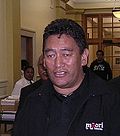Te Tai Tokerau by-election, 2011
|
|
|||||||||||||||||||||
|---|---|---|---|---|---|---|---|---|---|---|---|---|---|---|---|---|---|---|---|---|---|
|
|||||||||||||||||||||
| Turnout | 13,594 | ||||||||||||||||||||
|
|||||||||||||||||||||

|
|||||||||||||||||||||
|
|||||||||||||||||||||
Hone Harawira
Mana
The 2011 Te Tai Tokerau by-election was a by-election in the New Zealand electorate of Te Tai Tokerau that was caused by Hone Harawira's resignation from the seat. He chose to re-contest it with the Mana Party in order to seek a new mandate for his views. After generating several days of media interest and criticism Harawira announced on 4 May 2011 that he was delaying his resignation in order to consult his supporters in his electorate. On 11 May 2011 Harawira wrote to the Speaker of the House to resign from Parliament, with effect from 20 May 2011. On 12 May 2011 the Prime Minister John Key announced that the by-election would be held on 25 June.
Many politicians and political commentators criticised the by-election because it would occur so close to the 2011 New Zealand general election. Under New Zealand law, a by-election will not be held if there will be a general election within the next six months and 75% of MPs agree not to hold the by-election. So if Harawira had resigned later than 26 May then the by-election may not have occurred.
Harawira defended the by-election, which cost an estimated $500,000, by saying "It's hardly an expense in terms of democracy."
The New Zealand political blogging community viewed some aspects of the by-election as being very similar to the 1993 Tauranga by-election. That by-election was held on 17 April and the subsequent general election on November 7, after Winston Peters resigned first from the National Party, following disagreements with its leadership, and then as an MP in order to seek a "fresh mandate" for his views. The Tauranga by-election was labelled by media and opposing parties as a 'Publicity stunt', as was this by-election.
...
Wikipedia


